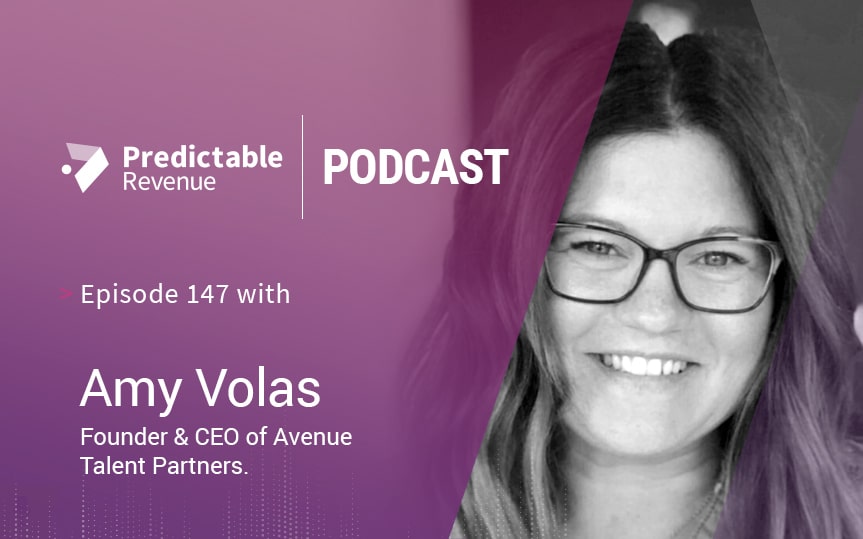Unpacking the “Why” Behind Who You Should Hire Next

I wanted to have a discussion with Amy about unpacking the “why” you should hire someone, but more specifically, I was interested in how she uses her sales strategy background when recruiting.
I’ve been in sales my whole life, and start-ups being my second love.
So combining the two topics would make for a very interesting discussion. Not wanting to seem too verbose, Amy politely advised she had sold over 100 million dollars in revenue during her own career, “so, there’s that,” she said. Letting us know she had definitely earned credibility and with that, we were off to a very good start.
The way this episode took shape, I became interested in the “why” after a conversation I had with a colleague wanting feedback on a potential hire. I paused thinking there was so much to unpack before a hiring decision should be made.
Who do you want to hire from a sales perspective and what are your capabilities?
Amy shared her reasoning as to why she chose recruiting sales professionals as her next career, and the importance of asking “why” hire that person. In her words “peeling back those layers” is necessary to understand how to get to a resounding yes in the hiring process. Just because it was a yes three months ago or four months or however long ago, because it was a yes then, do I need the same thing from that position in the future?
Unpacking the exact parameters of the role and doing the necessary diligence in terms of doing the work ahead of time, is the only way to avoid hiring someone, who may be amazing on paper, but wrong for the role. This may not be an issue, if you’re a high-growth company that has lots of cash in the bank and unlimited future positions because everything’s going to grow, but if you’re not adding 10-20 hires a month you risk hiring somebody awesome into the wrong role.
…and then they’re stuck and then they’re not happy.
Unless you’re a bigger company that’s totally scaling with deep pockets and you can afford the cost, you may not even realize that you might be pushing someone down and their thought might be, they can’t get out of there fast enough! It’s not just your responsibility to hire him or her, it was also her responsibility to accept the role – “I would put responsibility on both of you to have that conversation card face up.” Amy made perfect sense!
So many people, kind of take a backseat to this thing that’s called the hiring process.
Whether you’re a start-up that’s early-stage or one of the Facebook’s of the world, a mis-hire hurts your bottom line, she advised. One of the most important questions when interviewing a candidate, after all the jargon like corporate culture and mission statement, albeit important fluff, is what about the role does the candidate find most interesting. Discovering their “why” is vital and if they can’t be specific, that indicates they haven’t done their homework. We can help you build a multi-function Sales Development Team that researches your prospects, starts conversations with them, and introduces you to who qualifies.
The difficult question then arises especially when it comes to sales hiring — do you have enough territory to support your reps or the people that you’re going to be hiring? How are you going to support them? What will they actually be doing, what does that look like and even if you’re an early stage startup and you’re still trying to figure it all out, that’s okay she points out. Make that clear, “speak to that” be honest and make sure the person sitting in the interview chair is up for the challenge. The three main questions you need to ask yourself are; why am I hiring, what am I hiring for and finally how.
I think first and foremost if you don’t know why and you don’t know what, forget about the how.
Having a process that’s well documented and having the ability to understand who’s going to be involved and why they’re involved is at the forefront of a good hiring process. Being intentional with your internal job description. Getting the bullet points down means these are stakes we cannot do without and these are the things that we’re willing to compromise on and each time there’s a statement why these things are important for the company’s growth.
I knew from personal experience when we got very specific we ended up changing the hiring profile and we changed the job recruitment process.
Amy’s final words of wisdom were rooted in the scorecard process; it’s rooted in communication, and it’s rooted in thinking about yourself like a Four Seasons concierge. Never leave a potential hire hanging but rather treat them like you would a hot sales prospect you really want to close and not as somebody you’re doing a favor by giving them this job.
It’s wise to treat your recruiting process like the sales funnel it really truly is.
To learn more about hiring, check out the rest of her interview on The Predictable Revenue Podcast.
NO TIME TO READ?
Listen On:


